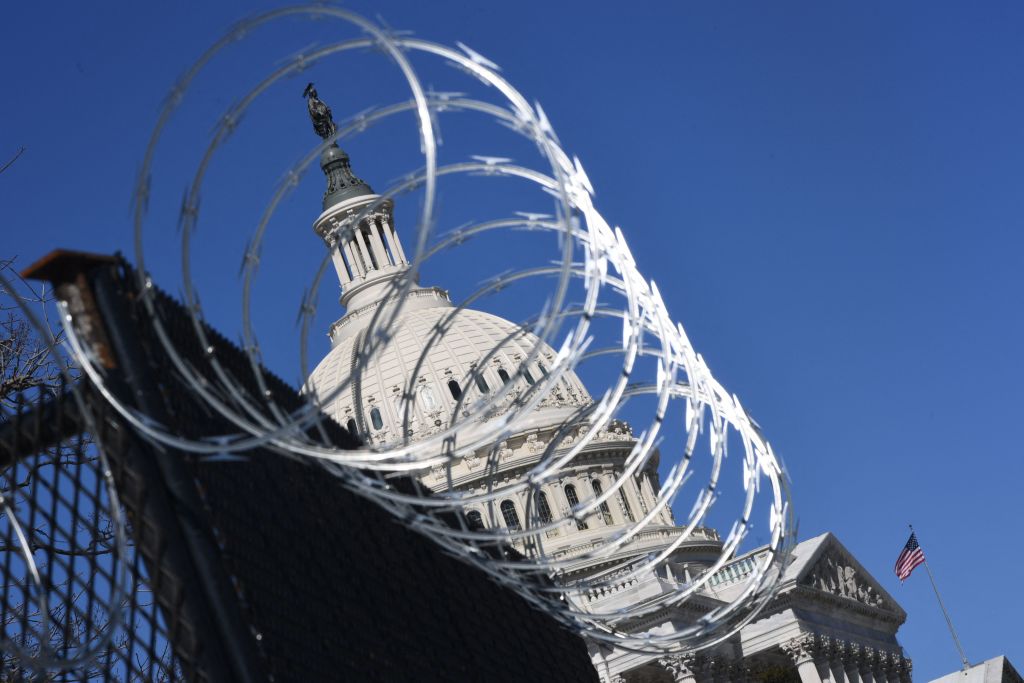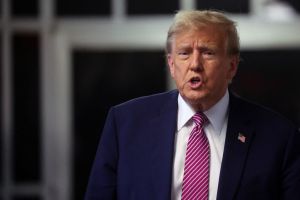For nearly a month last summer a violent insurrection claimed control of Capitol Hill — in Seattle, that is, not Washington DC. The insurrectionists were leftists who proclaimed the six or so city blocks under their power to be a new state-within-a-state, the ‘Capitol Hill Autonomous Zone’, or CHAZ. Multiple shootings, murders and acts of arson took place before police finally restored legal authority on July 1.
This insurrection, and the many other lethal incursions against the rule of law that took place last summer, have not occasioned much soul-searching or anger from progressives and liberals in the commentariat. The contrast with their fury over the riot at the US Capitol on January 6 of this year could not be more striking. Only one person died violently in that shameful episode, and she, Ashli Babbitt, was shot by law enforcement. Yet this time, for reasons that readers will have to deduce for themselves, the police are not being criticized for the use of force against unarmed lawbreakers. Instead, Democrats, and Liz Cheney, are treating this mostly peaceful protest — many thousands protested, a few hundred broke into the Capitol — as the new 9/11. Why?
‘Because they stand to gain from doing so’ would be the simple, cynical response. Democrats and progressives are terrified of losing power not only in government but throughout American society. The fact that Trump won the 2016 election was one blow to their confidence. The fact that they lost seats in the House of Representatives and failed to realize the gains they had hoped for in the Senate in last November’s election was an even greater shock. Trump himself increased his support beyond its 2016 levels and made startling gains among Hispanics and blacks. If not for the pandemic and recession, Trump would probably have been reelected, despite the spectacle of impeachment earlier in the year, and despite four years of conspiracy-mongering by prestige media outlets that presented Trump as a tool of Vladimir Putin.
Democrats and liberals talk a great deal about democracy. But most of the power that liberals possess in this country has nothing to do with elections: it is embedded in administrative agencies and faculty lounges, in human-resources departments and prestige media that editorialize in an overtly partisan manner even in their news reporting. So monolithic is the partisan culture of America’s elite institutions of opinion-molding that elections can almost be reduced to an afterthought: a ritual of affirmation for decisions that have already been made. Elections are competitive, but the competition until recently was well-managed, with the Republican party since the end of the Cold War picking as its presidential nominees candidates who posed no threat to liberal hegemony. John McCain, the 2008 nominee, was and is beloved by people who otherwise hate Republicans. Mitt Romney, the 2012 nominee, has likewise become a hero to the liberal establishment: the very day he was sworn in as a US senator, he took to the pages of the Washington Post to denounce other Republicans. George W. Bush prided himself on being ‘a uniter, not a divider’ — someone who would not upset the elite consensus in Washington, and who would work with Democrats like Ted Kennedy to increase the power of the federal government over education and expand entitlements. The first President Bush was much the same. While Bob Dole might have been a little different, he had little chance of winning by the time he received the GOP’s nomination in 1996.
Democracy to most Americans means competition in which parties and candidates have real differences and the public gets to choose between those clashing visions. But this is not what democracy means to the political class or to most pundits: to them, democracy means liberalism and progress — steady motion to the left, whether more or less quickly — and anything that might move politics or culture to the right is necessarily, by definition, undemocratic. The possibility that a crack might appear between what the public thinks democracy means and what liberals define it as meaning is a prospect too horrible to contemplate. Establishment Republicans like Liz Cheney, and many more who are less vocal than she is, share the horror that liberals on the other side of the party divide have of any assertion of a popular will that does not conform to the elite consensus.
The January 6 riot was not more violent than the riots that were countenanced throughout the summer of 2020. And in terms of the risk to human life — black lives most of all — the surge of violent crime in America’s cities is many orders of magnitude more serious than the injury to Congress’s honor. Yet Nancy Pelosi and Liz Cheney are not launching a 9/11-scale inquiry into the bloodshed in the capital’s streets, and in the streets of so many other increasingly troubled American cities. What non-selfish motive can possibly justify Pelosi’s and Cheney’s choice of priority?
The conventional claim would be that the January 6 attack on the Capitol was an attack on democracy itself, a trespass upon the sacred precincts of self-government. But how can liberals who have everywhere else demolished traditional forms of sanctity and reverence believe that Congress, of all things, will be spared from contempt? Liberals have taught Americans to disbelieve in God and to view everyone from the nation’s Founding Fathers to the greatest explorers and military commanders as mostly bad men — bad in part simply because they are men: white men, straight men, Christian men, biological men. Yet traditional femininity receives no more respect. Having obliterated veneration and awe in everything else, how can our liberal Jacobins believe that the Capitol building or hoary civic pieties about the work of Congress will be esteemed any more? You cannot complain if a country that people like you have seeded with unbelief turns out to be a country that doesn’t believe in your totems, either. If George Washington must come down, on what grounds can Washington as we know it today still stand?
No — if Americans should hate their ancestors, there’s no reason they should love the political institutions their ancestors produced. In other contexts, progressives are willing to say so: they would happily get rid of the Senate — it’s ‘undemocratic’, you see — as well as the Electoral College, and that’s just for a start. But still, if nothing else is inviolable, isn’t an election itself, the will of the people (properly managed, of course), so sacred that any attempt to interfere with it must be met with the harshest response? The January 6 rioters certainly thought so: they stormed the Capitol because they firmly believed the election had been stolen. They believed they were resisting an insurrection, not perpetrating one.
Yet their acts were criminal, whatever their beliefs. The riots themselves deserve punishment, no matter how hypocritical liberals may be in tolerating worse acts of violence out of political sympathy for the perpetrators. The attempt to demonize the vast majority of January 6 protesters who did not break the law, however, is the real threat to democratic freedom. This is because Americans have an absolute right, codified in the First Amendment, to petition Congress and to speak out about any action by the government whatsoever. The First Amendment doesn’t cease to operate after an election has taken place. The Americans who petitioned Congress on January 6 were fully within their rights, as was President Trump himself in calling for the crowds to ‘peacefully and patriotically make your voices heard’. If democracy is still sacred, the right to peacefully and patriotically make your voice heard to Congress is unimpeachable.
Trump, of course, was impeached over the January 6 melée — and not convicted or removed. (A moot point anyway since he was out of office by the time the Senate vote took place.) Democrats and their echoes in the media have been hypocritical in claiming that it is shocking and improper for Donald Trump or other Republicans, such as Sen. Josh Hawley of Missouri, to have challenged the certification of the Electoral College’s votes. Democrats had leveled such challenges themselves in 2001, 2005, and 2017, against each of the last three Republican victories in the Electoral College. The Democrats had only House members, not senators or a president, who were prepared to object in those years — but among the House Democrats who tried to change the Electoral College count in 2017 was Jamie Raskin, whom Democrats had the temerity to make one of the impeachment managers in 2021. Not only was a party that had challenged Electoral College certification now accusing the other side of trying to ‘overturn the election’ for doing the same thing it had tried to do, it even made one of the people who had tried to do it a prosecutor.
If hypocrisy so brazen were not enough to prove the dishonesty of the impeachment effort, the mutilation of evidence that the House managers engaged in would suffice by itself. The Democrats selectively cut the video of Trump’s speech to the crowd on January 6 to omit his use of the words ‘peacefully and patriotically’ in the context of calling for a march to the Capitol. If the case against Trump were as strong as Democrats and their allies insisted all along, why gild the lily, so to speak? Of course, if Trump were guilty of any criminal act, impeachment would be beside the point: he could be charged with a crime just like any other citizen once he left office and prosecuted in the ordinary fashion. This hasn’t happened, not because Democrats lack the will to do it, but because they lack a case.
And so rather than take the events of January 6 to court, where doctoring evidence is not allowed, the Democrats, with a handful of anti-Trump Republicans like Cheney, are staging another political spectacle: a commission. Their aim is to shore up their own faltering power by making more Americans scared of Trump and the Republican party as a whole (except for safe Republicans like Cheney and Illinois’s Rep. Adam Kinzinger). But the issue isn’t Trump, it’s the liberal consensus itself — a consensus that has failed America over the past 20 years and has undermined its own authority by thoroughly demoralizing and radicalizing the public. If liberals and Democrats really want to make sure that nothing like the January 6 riot happens again, it’s not Trump and the Republicans they should remove from public life, but themselves. Only once they are gone will there no longer be a market for Trump.


















